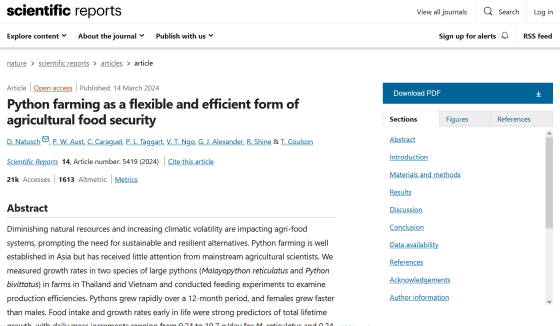Scientists say snake meat is a promising environmentally friendly meat option

Meat from cows and pigs is a valuable source of protein for humans, but livestock farming is one of the major sources of greenhouse gas emissions, so in recent years there has been a growing call to
Python farming as a flexible and efficient form of agricultural food security | Scientific Reports
https://www.nature.com/articles/s41598-024-54874-4

You Should Seriously Think About Eating More Python, Scientists Say : ScienceAlert
https://www.sciencealert.com/wild-new-study-suggests-we-should-put-more-python-on-our-plates-in-future
Even if we know that it is better to avoid eating beef and pork in consideration of the environment, suddenly switching to a vegetarian diet is difficult, and there is a risk of health problems due to insufficient protein intake. In addition, alternatives such as eating insects and artificial meat have been proposed, but there are various challenges to be overcome before they can be widely adopted.
So a team led by biologist Daniel Natusch of Macquarie University in Australia wondered whether pythons might be a promising environmentally friendly meat option.
According to the research team, cold-blooded animals such as snakes are much more energy efficient than warm-blooded animals such as mammals. In addition, reptile meat is high in protein and tastes good, similar to chicken meat, and python farming has already been established in parts of Asia.
The researchers studied two species of pythons that were kept on commercial farms in Thailand and Vietnam for over 12 months and then humanely slaughtered, and found that they consumed far less food in relation to the meat they produced than other farmed animals.
The ratio of meat produced to feed consumed was 10 for cattle, 6 for pork, 2.8 for chicken, and 1.5 for salmon, but only 1.2 for pythons. Snakes can thrive on waste protein from other meat industries and can fast for months without losing much weight, making them ideal for raising in environments with unstable food and water supplies.
'The ability of fasted pythons to adjust metabolic processes and maintain body condition enhances food security in unstable environments, suggesting that python farming could be a flexible and efficient response to global food insecurity,' the researchers argue.
However, there are still challenges, such as 'feeding snakes is labor-intensive, meaning it is a field that relies heavily on human labor, and the know-how to mass-raise them without human costs has not been established,' and 'many people have aversion to eating snake meat,' so it is unlikely that snake meat will become widespread anytime soon. 'Combined with the general fear of snakes that humans have, it may be some time before the agricultural potential of pythons is realized on a global scale,' the research team said.

Related Posts:







